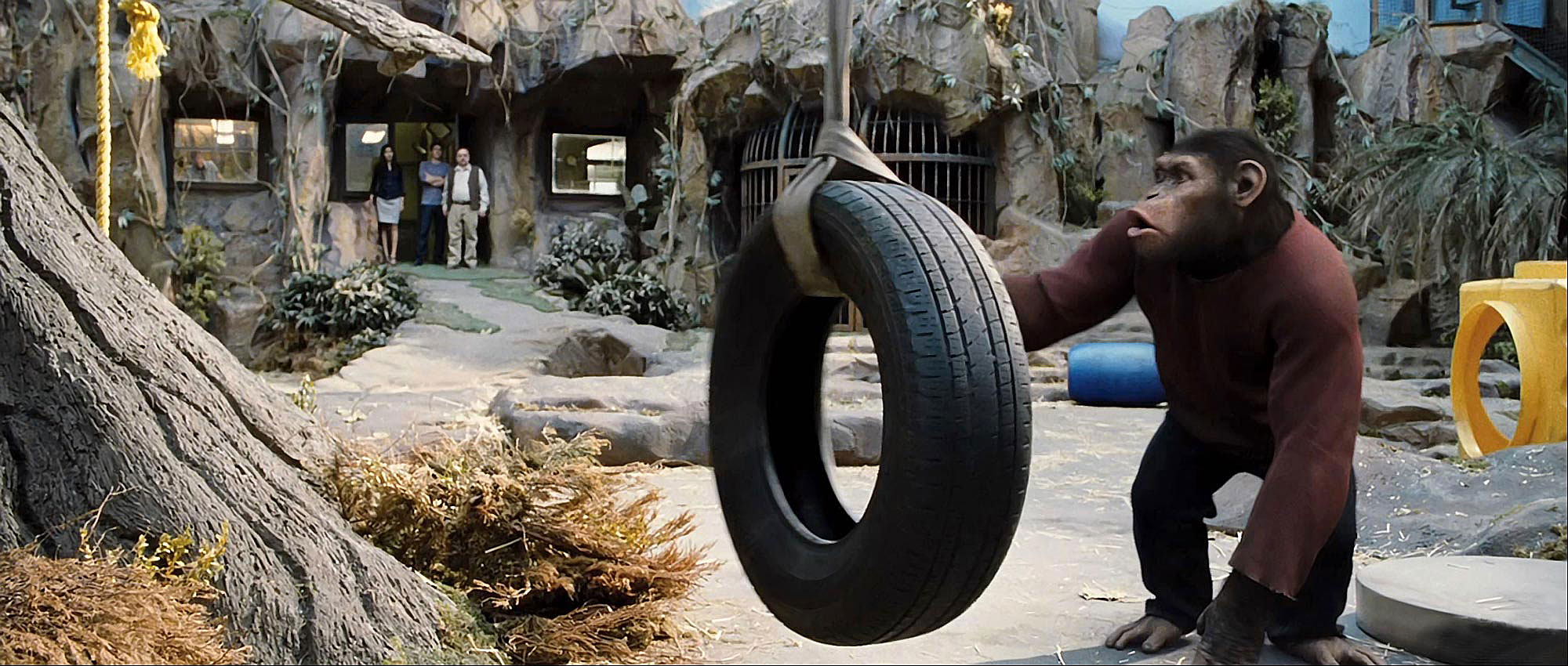Rise of the Planet of the Apes shows us a twisting double helix of evolution and revolution, yet despite some faint cinematic moments and some well rounded character development, it feels all-too simplified and, disappointingly, all too human. The prequel, set sometime in an early 21st Century San Francisco, sees the hubristic tampering with Mother Nature through the lab techniques of a big American biotechnology corporation. Staying as close to generic sci-fi conventions as possible, this biogenetic experimentation – spearheaded through the scientific efforts of James Franco’s character Will – takes a potentially world-improving medical cure to its darkest inversion as the catalyst for world catastrophe… and eventually, the inheritance of the Earth by our closest relative.
Most interesting is that the impending catastrophe that audiences are all too aware of approaching, will not be prevented – this is a disaster movie where the audience is empathetic and committed to the disaster itself. The final coordination of human extinction hovers over the film fatally. Propelled by corporate greed, stifling bureaucracy and the usual short-sighted drive for profit, there aren’t many reasons to care or stick with the status quo. The harbinger of the new world is the chimpanzee Caesar (played by Andy Sirkis, although the performance is as much to do with the visual effect work). This orphaned chimp is the first of his kind, a genetic miss-hap, and a close adopted friend to Will and his Alzheimer inflicted father (of which the biotech serum is intended to be a cure for). The dynamic between these three characters make for the occasional heart-warming, if not also cliché, moments, yet it’s still all a little too humanist. The primal moments, which make up most of the second half of the film, are far more interesting, yet many of the inter-ape interactions fall short. The apes’ fight against humanity seems wholly justified, but it seems as if there is a certain pacification of the “damn dirty apes” in their portrayal. The primate Others almost instantly became ‘human apes’, whilst I can’t help but prefer routing for them when they were Hollywood ‘bad guys’.
 The visual effects are well produced, with some great CGI expressions and generally solid monkey-mannerisms. What we can give in empathy however, is somewhat lost in the final sequences. This should be a story of apes breaking barriers – a revolutionary fighter, yet you cannot help remembering Caesar as the opposite – a domesticated pet who’s all too human. What makes Caesar so relatable also diminishes him. His sentimental tie to Franco’s character overshadows the relations he creates with his own kind, and the worldview that should have been based around wild freedom, apish emancipation and indeed – as the poster’s claim – “evolution and revolution”, becomes caught up in the ritualistic fetishisation of individual identity and the retrospective recuperation of all that is radical (non-human in this case). Nevertheless, despite the emotional baggage, Caesar is a world-mover, the driver of history within the Planet of the Apes universe – and for that, I suppose he is notably interesting as a character. There are some spectacular and powerful images here, very much reminiscent of the “2001: A Space Odyssey” introduction. The action set pieces are quite impressive. The shots around the National Redwood Park and Golden Gate Bridge are particularly strong, although there is a few too much time spent around suburban streets to offset this. The ending comes a little too abruptly, and the film is heavily formulaic, all too safe and cosy, but the journey is largely a satisfying one.
The visual effects are well produced, with some great CGI expressions and generally solid monkey-mannerisms. What we can give in empathy however, is somewhat lost in the final sequences. This should be a story of apes breaking barriers – a revolutionary fighter, yet you cannot help remembering Caesar as the opposite – a domesticated pet who’s all too human. What makes Caesar so relatable also diminishes him. His sentimental tie to Franco’s character overshadows the relations he creates with his own kind, and the worldview that should have been based around wild freedom, apish emancipation and indeed – as the poster’s claim – “evolution and revolution”, becomes caught up in the ritualistic fetishisation of individual identity and the retrospective recuperation of all that is radical (non-human in this case). Nevertheless, despite the emotional baggage, Caesar is a world-mover, the driver of history within the Planet of the Apes universe – and for that, I suppose he is notably interesting as a character. There are some spectacular and powerful images here, very much reminiscent of the “2001: A Space Odyssey” introduction. The action set pieces are quite impressive. The shots around the National Redwood Park and Golden Gate Bridge are particularly strong, although there is a few too much time spent around suburban streets to offset this. The ending comes a little too abruptly, and the film is heavily formulaic, all too safe and cosy, but the journey is largely a satisfying one.
